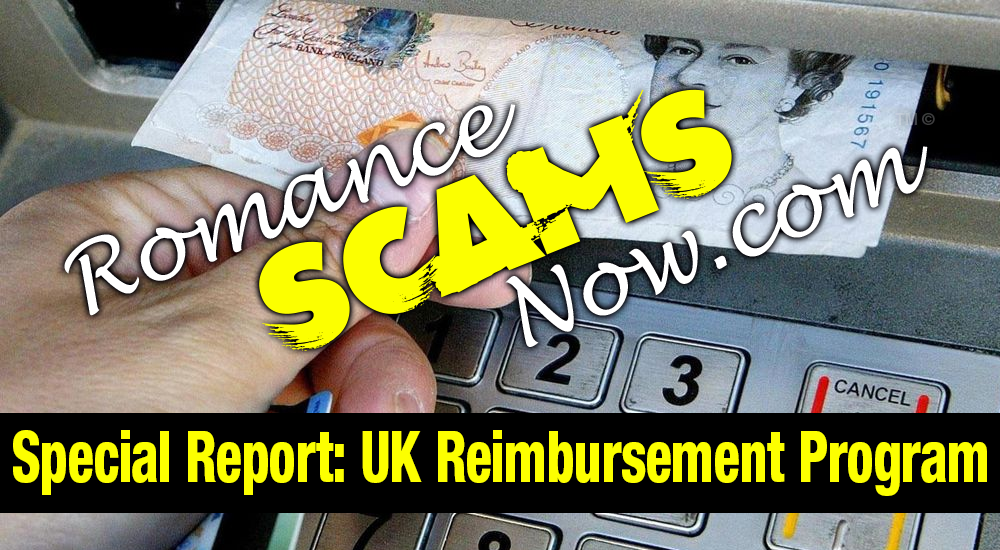RSN™ Special Report: UK Victims May Get Reimbursed
Transfer Scam Victims Could Be Reimbursed – Great News For Scam Victims In The U.K.
Portions by SkyNEWS
Victims of bank transfer fraud could receive compensation under proposed new rules – though it remains unclear who will pay.
Bank account holders who are tricked into transferring money to fraudsters could be entitled to reimbursement if they have acted with the “requisite level of care” under proposed new rules.
Latest figures show consumers lost £92.9 Million to authorized push payment (APP) scams in the first half of 2018 – but unlike victims of other types of fraud such as credit or debit card scams, they are currently not entitled to be repaid by payment providers.
A body set up to address the issue has now proposed changing this, though it has yet to resolve who will pay for the compensation in cases where banks have also acted with due care.
It Follows Campaigns By Consumer Groups For Banks To Shoulder More Of The Burden In Such Cases
A new voluntary code to address the issue has been drafted by a steering group set up by the Payment Systems Regulator (PSR).
It aims to make it harder for criminals to commit APP fraud, set out how consumers can be vigilant and give them greater protection and support from banks.
“Importantly, the code proposes the principle that where a consumer has met their requisite level of care, they should be reimbursed,” the group said. However, the report has not been able to resolve who will pay for the compensation in cases where “no bank or other payment service provider involved in the payment journey has breached their own level of care”.
The steering group said it would work to consider and identify “a sustainable funding mechanism through which to reimburse consumers in such a scenario”.
Unfortunately, Such A System Of Reimbursements Will Ultimately Be Paid For By The Consumer In Higher Fees!
It will also try to resolve other aspects of how the process will work, including how to settle disputes between banks and other payment service providers.
A Final Version Of The Code Is Expected By Early Next Year (2019)
Ruth Evans, independent chair of the steering group, said: “This is a unique initiative bringing together the industry and consumer groups to set out how best we can tackle this issue – and really help those people who’ve become victims of these devastating crimes.” She said the report “marks an important step towards greater and more consistent protection for consumers and stronger standards for how banks and other payment service providers will prevent this type of fraud happening in the first place”.
The PSR said the report was a “positive step forward” and that in a further move it was planning to consult on new requirements for banks which would help to prevent APP scams.
Industry body UK Finance said it was committed to ensuring consumers were better protected from fraudsters and had invested millions in security systems as well as introducing new standards on helping victims and supporting law enforcement.
UK Finance chief executive Stephen Jones said: “It is vital that we get the right outcome for customers and prevent the UK from inadvertently becoming a magnet for fraudsters, while ensuring innocent victims and customers are not penalised for the criminal actions of others.”
He said it was clear that new regulation was needed rather than just a voluntary code.
“This will ensure that consumers and financial institutions can be certain in what circumstances victims will be compensated and how this compensation is funded in circumstances where all parties have acted reasonably in making the payment,” Mr Jones said.
At this moment it is not clear if victims will be able to files for transfer that happened prior to the new rule taking effect or now.
Be sure to follow RSN for more news about this topic!

RSN™ Team
a division of SCARS™
Miami Florida U.S.A.
What are the warning signs of wire transfer fraud?
Know how to recognize the warning signs of wire transfer fraud:
- Someone that you have never met in person is asking for money. This is the biggest red flag for fraud. If you’re in a long-distance relationship with someone you’ve never met in person, be wary of possible fraud, if they start asking for money. The reality is: fraudsters are professionals and they’ll do whatever it takes to get their hands on your cash. When it comes to that new love, overseas inheritance or investment opportunity, it’s worth the cost of the plane ticket to ensure it’s legit. If you can’t meet them in person, you should think twice before sending your money.
- You receive an email that claims you’ve won a jackpot but you have to pay fees before you can receive the prize. The reality is: the fraudsters are the ones hitting the jackpot. If it sounds too good to be true, it probably is.
- You see an ad online for a great deal, but you’re required to transfer the money right away to receive the product. The reality is: the product doesn’t exist and they just want your money.
- While many people use wire transfers to pay for luxury items, it’s worth checking the reputation of the seller, if you’re transferring a large sum.
- You get a job as a mystery shopper but they send you a check for more than what you’re owed. You’re asked to send the excess funds back via wire transfer. The reality is: this is just a clever way to steal your cash, as the check is probably fake.
- You receive an email from someone pretending to be your bank or other service provider saying you need to update your security info. The reality is: as soon as you click the link, you’re vulnerable to malware. Phishing emails that try to steal your information or get you to wire money will often contain a lot of spelling and grammatical errors. The email might not address you by name, and it comes from a suspicious and unrecognizable source. It will probably ask you to provide financial information or to verify it, but if you hover over a URL, you’ll see that it will take you to a suspicious and unknown website. Don’t click on any links within these emails; instead, just delete them and block the sender.
- You receive an email or a phone call that claims the IRS wants you to pay back taxes, and you need to transfer your money or you’ll be arrested. The reality is: the IRS will formally contact you by mail rather than by phone, and they won’t be asking for your payments by credit card or by wire transfer either.
END
– – –
Tell us about your experiences with Romance Scammers in our Scams Discussion Forum on Facebook »
– – –
FAQ: How Do You Properly Report Scammers?
It is essential that law enforcement knows about scams & scammers, even though there is nothing (in most cases) that they can do.
Always report scams involving money lost or where you received money to:
- Local Police – ask them to take an “informational” police report – say you need it for your insurance
- Your National Police or FBI (www.IC3.gov)
- The Scars Worldwide Reporting Network HERE or on www.Anyscam.com
This helps your government understand the problem, and allows law enforcement to add scammers on watch lists worldwide.
– – –
Visit our NEW Main SCARS™ News & Information Facebook page for much more information about scams and online crime: www.facebook.com/SCARS.News.And.Information
To learn more about SCARS visit www.AgainstScams.org
Please be sure to report all scammers HERE or on www.Anyscam.com
All original content is Copyright © 1991 – 2018 SCARS All Rights Reserved Worldwide & Webwide – RSN/Romance Scams Now & SCARS/Society of Citizens Against Romance Scams are all trademarks of Society of Citizens Against Romance Scams Inc.






As a victim of a Romantic Scammer whom I have reported via this site. Is there any way that I can know that the information which I provided has been used to catch a scammer.
This person/persons are still attempting to contact me now threatening to send personal photos to my family I think, in an attempt to blackmail me??
No there is not. It is provided to the agencies and entities that receive our feed in real time. But most will be used to watch for potential opportunities in the future. Such as when a scammer is arrested then law enforcement will look for other victims. With over 100,000 scammers working law enforcement has a massive task and they do not jump on each report to investigate them. Scammers are spread around the world and international investigations are now easy. You did your duty by reporting the crime. Now you have to take the steps necessary to protect yourself and block all access to your scammer, and that may mean telling your family that someone is harassing you. These are the sad consequences of becoming involved with a scammer.